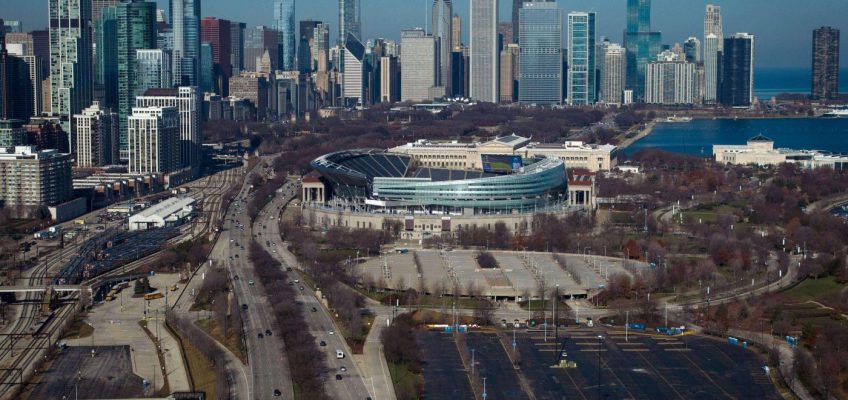When news broke of the Bears considering a new stadium on the land currently housing the south parking deck, it gave many Chicagoans hope that the team would remain nestled on the lakefront and that we would maintain our distinction of being the largest city in the country where every professional sports team plays its home games within the city limits.
The possibility of the Bears building a stadium and remaining in Chicago signals that a reset between the Bears organization, by way of new President Kevin Warren, and Mayor Brandon Johnson is not empty rhetoric, but it is the true desire of both parties, which is good for Chicago.
In Warren, the Bears have a proven transformational leader. He is the architect of one of the most monumental professional stadium deals in U.S. history, which allowed the state of Minnesota to pay off bonds 23 years before the final payment was due. Johnson has been clear-eyed and optimistic about the Bears’ situation, which has allowed the conversations to begin anew.
People opine that Soldier Field is the worst stadium in the NFL for overall fan experience, and these arguments are valid, mainly because Soldier Field was never intended to be a football stadium. The Bears ended up there because they had nowhere else to go.
Many factors make Soldier Field less than attractive for the modern era. In addition to the aforementioned impediments, the Bears can’t profit off of parking and other assets, and they are one of only two NFL teams that cannot generate revenue from the naming rights of the stadium. Building a new Chicago stadium presents an opportunity for the Bears to craft a smarter agreement that does not hinder them, one that uses precision in crafting the stadium usage deal. There is no barrier to creativity for this option.
NFL stadium usage deals run the gamut. In Chicago, the Bears pay rent of about $6 million a year. In New Orleans, the Saints get paid around that same amount by the state of Louisiana, and in Baltimore, the Ravens don’t pay rent, but they do pay for utilities and salaries for the staff of the Maryland Stadium Authority. It is not so much that the Bears need to own their stadium, but that a balance needs to be struck that is favorable to Chicago and the organization. We should be looking to tailor-make a deal that works specifically for our realities in Chicago.
Over the years, we’ve heard suggestions that the Bears should move to various places, including Evanston, Arlington Heights and Gary. As an attorney who has worked on stadium deals inside and outside Chicago, an avid sports fan and the elected representative of Soldier Field and the surrounding community, I have been clear about my stance on public subsidies for private development, but I have also been clear that I truly believe that the Chicago Bears should play football in Chicago.
The opportunity to be bold and smart exists in full form. We can create a public-private partnership on the lakefront that works. We can be cutting-edge when it comes to the carbon footprint of a new stadium, by building a low-carbon, eco-designed stadium. We also have a chance to use this as an opportunity to finally connect our lakefront and our people through public transit solutions.
We should be asking if a new stadium can help us chip away at our legacy pension debt issues and do the work to reverse-engineer that result by figuring out the right financial mix to reach that result.
An advantageous solution may lie just south of the parking deck at the Lakeside Center. In 2019, I introduced a bill to rebuild its aboveground portions, while returning additional parkland to the people and preserving the underground portions of the building, such as the Arie Crown Theater. Could a convention center connected to an NFL stadium work? It seems to be doing so in Indianapolis, where the city’s convention center and the Lucas Oil Stadium are connected. The stadium has hosted Super Bowls, Final Fours, College Football Playoffs and many Big Ten Championships.
Many, if not all, of these possibilities would require some attention from the legislature in Springfield, and I happen to know some folks down there who would be willing to help.
This leaves the question: What to do with Soldier Field? Let’s be honest. We are about six months away from having another public debate in Chicago about the lack of public spaces for young people — the Chicago Park District’s first stated core value is “Children first.” Soldier Field is the biggest Park District facility and simultaneously one of the least used; it would be counter to those core values to tear it down instead of finding ways to program it for Chicago’s young people.
Finally, with a Chicago-friendly White House, we should be lobbying President Joe Biden’s administration to restore Soldier Field’s historic landmark status so we can regain access to the millions of federal dollars for the building that we have missed out on since we lost that designation in 2006. Whether or not you are a fan of the old columns or the spaceship that landed in them, there is no question of the historical significance of a site that has hosted so much of America’s history.
This is a once-in-a-generation opportunity for the public and private sectors to work together, for Springfield and City Hall to work together and for the NFL to prove that it is as adept at making deposits in its most important cities as it has been in making withdrawals.
I believe that we can figure it out, and we don’t have to wait for a Super Bowl win to do it.
State Rep. Kam Buckner, a Chicago Democrat, represents the 26th District.
Submit a letter, of no more than 400 words, to the editor here or email letters@chicagotribune.com.
()


Leave a Reply